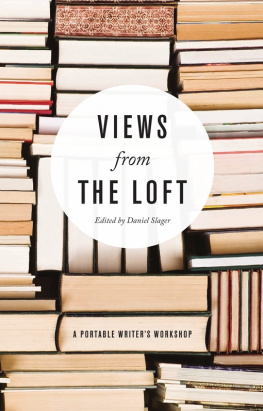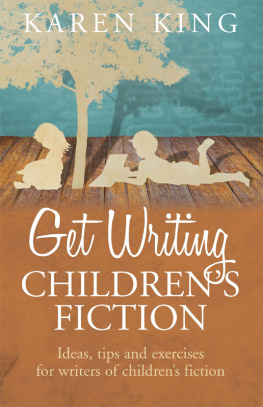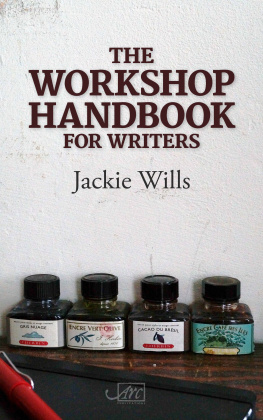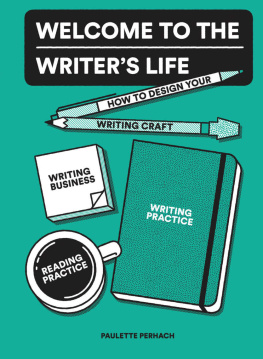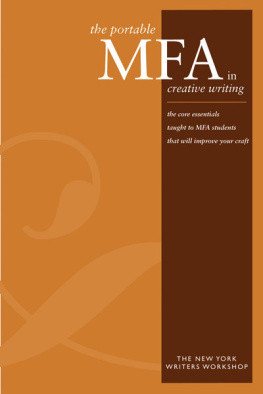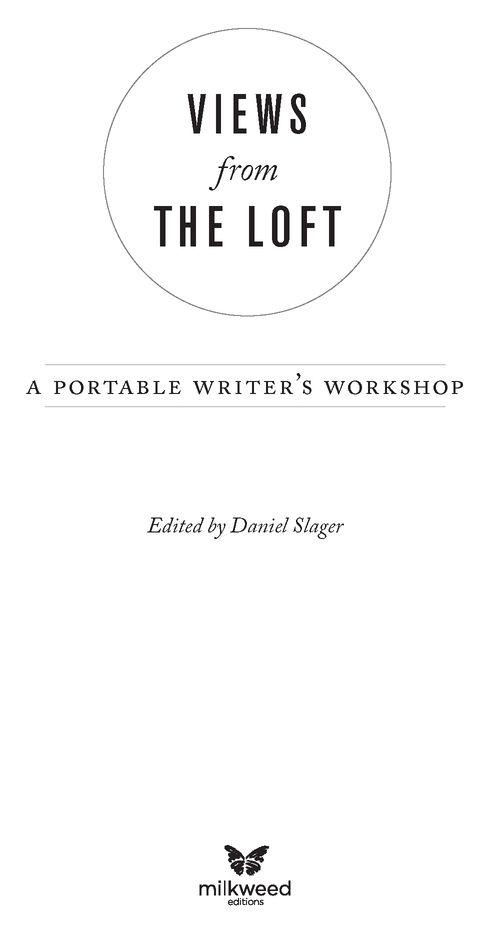Table of Contents
This book is dedicated to Marly Rusoff and to the literary community. It would not have been possible without all former and current Loft teachers, funders, board, staff, supporting members, students, and readers and writers.
Introduction
DANIEL SLAGER
As the publisher of Milkweed Editions, I receive many submissions. Whether they arrive with the imprimatur of an agent or stuffed into a mailer by the writer who produced them, these manuscripts are a source of great pleasure and occasional exasperation. On one hand, discovering a highly original, entirely unexpected piece of writing is for me the greatest joy of editing and publishing books. On the other hand, because of their daunting numberseveral thousand submissions arrive in our office each yearand the time required to consider each of them carefully, it is also easy to forget the life a manuscript leads before it lands on my desk.
When I do feel overwhelmed by submissions, I often step out of my office and walk through Open Book, the singularly beautiful literary center that provides a home for Milkweed Editions, The Loft Literary Center, and the Minnesota Center for Book Arts. Beginning in the basement, I stroll the halls between old limestone walls, the faint rhythmic clack of printing presses in the Center for Book Arts softened by the warm scent of ink. From there I ascend to the first floor, where the smell of handmade paper mixes with the sounds of a poetry collective assembling the pages of their latest anthology and schoolchildren on a field trip. Walking through the Coffee Gallery, Im surrounded by writers of diverse ages and backgrounds, crafting, critiquing, and discussing books, texts, and ideas. Up the Gail See staircasewhich itself serves as an architectural metaphor joining the craft of bookmaking with literary contentaspiring screenwriters, travel writers, poets, novelists, and journalists develop and share their work with one another, or listen intently as mentors help them find their way. Emerging back onto the third floor, I reenter our office and walk past editors, publicists, and interns, cajoling and entreating authors, reviewers, and booksellers.
Back at my desk, the manuscripts are still piled high. And yet, seeing them now, with the feeling that Ive just witnessed nearly the entire life cycle of a book, they dont seem so discouraging. I still sense the hard work required for their composition, of course, but I also hear the laughter-filled conversations of writers over coffee or beer, the sound of type falling into place for the broadside of someones first poem. I see the look of wonder on a young writers face as she gives herself over to what Kate DiCamillo describes as the potent stew of ego and defiance and desperation and magic and faith animating the writing process. In short, while Im quite well aware of writers desire for publication, after a walk through Open Book I cant help but remember that the most wondrous moment in the literary process is not a books publication, but rather its composition.
For some, this moment is spontaneous. But for most the creative spark occurs in a communal moment of some kind, often entailing the encouragement and critique of other writers. And though the writers workshop is a national phenomenon, for nearly four decades now The Loft Literary Center has provided this very support to more writers from more diverse backgrounds than any other program in the country. To this end, the Loft has gathered a veritable whos who of our nations most inspiring writers, who have in turn taught classes with subjects ranging from Food Writing for Beginners to Dialogue and Subtext. They administer the Mentor Series, in which established authors work with a group of students who have demonstrated extraordinary achievement and promise, and the Inroads program, where nationally acclaimed writers of colorNative Americans and Latinos, most recentlywork with emerging writers from these communities. By way of these and other programs, the Loft has provided the community of writers and readersnot to mention the bards, for, as the indefatigable Bao Phi reminds us, oral traditions of storytelling and poetry predate written literaturewith invaluable inspiration, advice, and wisdom.
Since its inception a decade ago, Open Book has been a profoundly collaborative space. And so when Jocelyn Hale, the Lofts Executive Director, approached me with an expression of interest in supplementing the experience of their students while also sharing it with the world of writers beyond the Lofts geographical reach, I leapt at the opportunity.
In 1976, the Loft began publishing a monthly newsletter for members, and in 1979 it was expanded, redesigned, and renamed A View From the Loft. Since then, a major component of the Lofts newsletter has been a regular column by writers from around the world. Gathering columns from the newsletter, this collection provides writers everywherefrom the most experienced workshop junky to the novice scribblerwith the tools and inspiration they need to thrive. Indeed, with sections entitled Teaching, Writing, Critique, Publication, and Writing for Life, the contents are structured after the form of a workshop, in an attempt to bring the wonderful experience the Loft has provided for decades to an even broader audience.
Perhaps not surprisingly in light of the variety of perspectives animating our literary world, however, those who come to this collection expecting clear, unified guidance or answers for any number of age-old questions facing writers will be sorely disappointed. For every contributor who suggests that you should Write what you know, there is another who argues, as Leslie Adrienne Miller does in the context of an exchange with Heid Erdrich, that The enemy of poetry is familiarity. And there is plenty of grist here for those with strong opinions regarding such fundamental questions as the proper role of authorial identity in literature, or the responsibilitythe possibility, evenof truth and factual accuracy in memoir.
As you read through the following pieces, it is my great hope that the simple phrase, Views from the Loft, will come to mean more. On one level, it means a building full of words, stories, and creativity. Moving through Open Book one literally moves through a book, surrounded at any moment by the genesis of countless literary and artistic experiments. Moving through this book, on the other hand, it means a perspective that encompasses and engenders the love for and importance of one of humanitys dearest and most vital tools, the creation and dissemination of good stories. I hope you enjoy the views.
Daniel Slager
August, 2010
Teaching
TOPICS ADDRESSED:
Lock Picking
Looking Long and Hard at a Fish
Absentminded Hunting
Resurrection-Based Research
First-Draft Catharsis
Doing Justice to Grandma
Conjuring Something from Nothing
Judgmental Grade School Teachers
Major Cuts
Ernie Kovacs and Poetry
Avoiding the Phony, Jerk, or Creep Inside
Expanding, Expanding, Expanding...
Comes a Pony
KATE DICAMILLO
Here is a picture of a pony. Lets start there, shall we? With the picture. Take a look. What do you see? A gravel road. Palm trees. Shadows. A barefoot girl on a pony. The roof of a house. The tailgate of a 1969 Ford.

